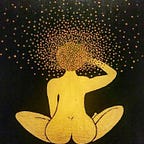OPEN LETTER FROM A WEB3 ENTHUSIAST: Who didn’t understand WTF it was beforehand.
Back in 2014 a friend told me to invest in Bitcoin. One bitcoin at the time was approx. $400 USD. Like many other people back then, I had no idea what this was, let alone any understanding of Blockchain technology. I refused to even process it all, and passed on this suggestion of what I called (at the time) “fake money that may disappear one day.” Needless to say, you don’t have to understand cryptocurrency to now know that Bitcoin’s current value has skyrocketed way past 5 digits since, and I kicked myself for missing the opportunity to make a huge return on that initial investment. But this planted a seed, or rather, created a very tenacious curiosity within me.
Fast-forwarding to 2018, when I started really looking into understanding cryptocurrency, and the inner mechanisms of the blockchain. I fell down the proverbial rabbit-hole, much like a very nerdy Alice in Wonderland and began taking tutorials, connecting with more knowledgeable people while wrapping my analog 80s baby brain around this new digital reality.
Web3. What was that? If Web2 was “the version of the internet we knew to date, dominated by companies that provide services in exchange for your personal data”- then Web3 created an explosion of infinite possibilities with its decentralized apps which run on the Blockchain. This decentralized internet “provides the foundation for peer-to-peer communication, payments, services, and marketplaces.” Meaning, that third parties have less control over user interaction and value transfers. THIS was exciting to me.
As the daughter of a Canadian diplomat and Rwandan intellectual, I spent the majority of my life bouncing back & forth between the American and African continents. Oftentimes, having access to people or certain items (like coveted new CD releases, because: pre-Napster era), would require me traveling across the ocean with the eagerness & anticipation of a child at Christmas. Immense patience was required! It wasn’t until the birth of the internet, that I discovered a new way to stay in touch, via email (and later social media) much more efficiently with friends and family all over the world.
This was a game changer.
Blockchain technology and cryptocurrency play a significant role in shaping the current development of Web3 and the entire decentralized movement. But for those of you who struggle with the learning curve of this jargon, I ask you to consider this: what is the value of true freedom of community to you? What benefits can you extrapolate from the whole shift we are currently experiencing from Web2 to Web3? Well, if you fall just a little bit down the rabbit-hole with us, you’ll quickly discover that the technology we once feared would create a further disconnect within our human experience (remember the digital panic on New Year’s eve 1999?) has morphed into a nurturing space for ALL communities.
You’re probably hearing a lot about NFTs lately. As a matter of fact, I’m currently preparing to do an ‘NFT 101’ workshop for my African Artists Coalition. The point is, once you start understanding NFTs and smart contracts (see: ERC-721) you’ll soon realize the great potential of its utility. When you mint an NFT to the blockchain, consider it a sort of digital certificate of authenticity that is locked in forever. This means, no more wondering about the true provenance of a collectible because the blockchain logs the transaction details of its creation- forever onto its ledger. But also, smart contracts allow for royalties to be collected off of every future resale. This means that the built-in automated contract makes sure the creator receives a percentage every time someone resells their NFT. Both these things are extremely important when it comes to heritage preservation. Imagine your great great grandchildren getting residual income off of your hard work long after you are gone? Talk about building a legacy!
On my end, I minted the first EVER Rwandan Art NFT back in February of 2020. I think this was my way of seeking to practice a process I spent so much time studying, but also a desire to plant a flag. I recalled hearing about how most African fabrics were being manufactured in non-African countries. Part of me simply didn’t want to see a non-Rwandan be the first to create a so-called ‘Rwandan’ NFT…
Beyond that, I’ve been learning a lot about DAOs lately (Decentralized Autonomous Organizations) and token economy. It would probably require a whole other workshop to delve into this topic- but I will emphasize this: in my humble opinion, DAOs will revolutionize business infrastructure. However, a DAO is most successful because of its community. ALL of which are the equivalent of ‘shareholders’. DAO members can purchase or receive tokens which enable them (as token holders) to vote on initiatives executed by the organization. In essence, this is a TRUE return to organic community and democracy. Long gone are the days where lawyers are needed to enforce contracts, and there can be no rigging that ‘electoral’ process. Everyone gets peace of mind due to clear blockchain protocols. There is NO third party. Just you & your DAO community.
True organic connection. Isn’t that what we seek from our human experience?
ONE Love,
~an analog girl, living in the digital world.
